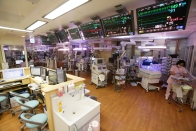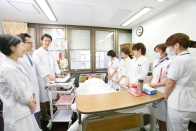| Center for Maternal - Neonatal Care |
| Director HAYAKAWA, Masahiro (Clinical Professor) 4E |
| Comprehensive support for the health of mothers and babies using advanced medicine |
| The Center performs obstetric medical care, reproductive medicine, intensive care for premature babies and pathologic newborn infants including high risk childbirth. |


Medical Care System
Nine specialized doctors in the departments of obstetrics and reproductive medicine and nine specialized doctors in the neonatal department provide medical care. Even at night and on holidays, specialized doctors are assigned to the respective departments, who perform emergent childbirth delivery procedures and operations, handle emergent hospital admission, and monitor severe newborn infants.
Target Disease
The Center targets high risk pregnancy (pregnancy induced hypertension, pregnancy complicated by maternal disorders, placenta praevia, fetal disorder, etc.), infertility (endometriosis, uterine fibroid, fertility-preserving and recovery treatment), premature / low birth weight infants, critical ill infants (neonatal asphyxia, newborn infants with surgical disease complications, etc.).
Strong Fields
Fetal abnormality, placenta praevia accreta, total assisted reproductive technique such as in vitro fertilization, microinsemination, monitoring of severe newborn infants using advanced medical technology such as extracoreporeal membrane oxygenators or hypothermia.
Clinical Results
Recorded the following numbers of clinical cases in 2010: childbirth delivery (492 cases including 193 cases of caesarean operation); mother conveyance (31 cases); congenital abnormal fetus (53 cases); in vitro fertilization (100 ovum collection periods); embryo transfer (139 periods); newborn intensive care unit (NICU) hospital admission (270 cases); extremely low birth weight infant (11 cases); and congenital diaphragmatic hernia (nine cases).
Advanced Medicine and Research
Researching clinical conditions of placenta previa accreta, predicting severity of fetus' diaphragmatic hernia, continuously observing embryonic development using an incubator with a microscope and studying regeneration medicine using stem cells for perinatal brain damage.










